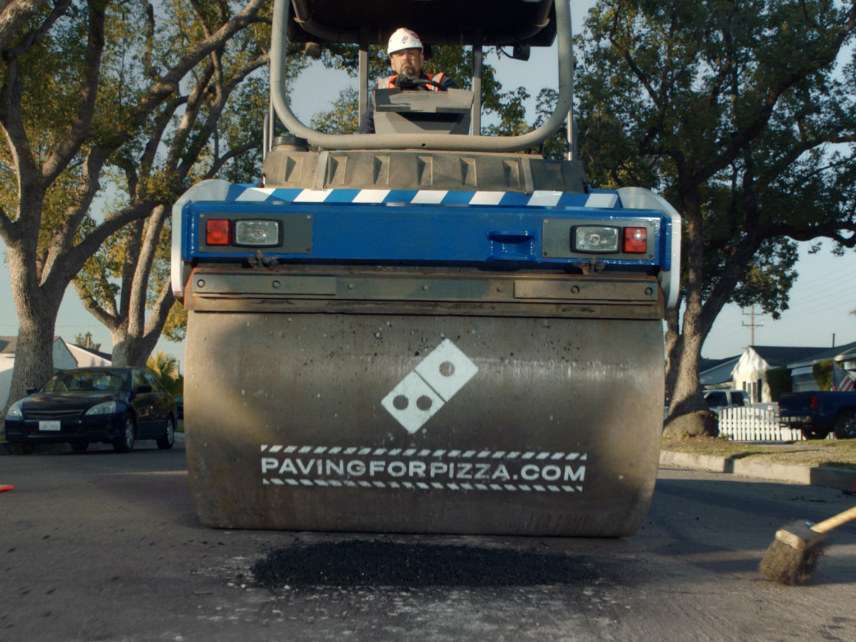Domino's Will Build the Roads
The company's "paving for pizza" initiative answers an age-old question.

People often ask who would build the roads in a libertarian society. This week brought a new answer: Domino's.
On Monday, the pizza company unveiled its "Paving for Pizza" initiative, promising to partner with customer-nominated towns to fix up pot holes, repair road surfaces, and otherwise help provide a service many Americans think of as an exclusively public responsibility.
"Have you ever hit a pothole and instantly cringed? We know that feeling is heightened when you're bringing home a carryout order from your local Domino's store," said company president Russell Wiener in a press release. "Domino's cares too much about its customers and pizza to let that happen."
So far, Domino has helped fix up roads in one town apiece in Texas, Georgia, Delaware, and California. The company has plans to partner with as many as 20, according to Domino's Public Affairs Director Jenny Fouracre.
Each of those 20 cities is getting a $5,000 grant, so Domino's is committing as much as $100,000 to its infrastructure initiative. That won't buy you much blacktop, but some cities are still happy to have it.
"For us it really paid off and it's been viewed as a positive in our community," says Eric Norenberg, city manager of Milford, Delaware, whose town put their $5,000 grant toward fixing up 40 potholes.
Yearly road maintenance, says Norenberg, can take up about 10 percent of his city's operating budget. The state covers just a little bit of that and the federal government none, so the corporate sponsorship is welcome.
"It's not something we've done before. In a situation like this, if all other things were equal, we would try to something similar. I really hope this means that other companies will look to step up."
Of course even this small private grant has been enough to stoke fears of an imminent corporate takeover of the nation's roads.
"This feels like something from a William Gibson cyberpunk dystopia novel, where the government has become so weak and useless, private corporations have been taking over the basic upkeep of the nation," writes Jason Torchinsky over at Jalopnik.
"What kind of state are we in as a society when Domino's pizza takes a responsibility to fill potholes. Filling potholes is a function of government. Ultimately the goal for Domino's is to sell more pizzas. That shouldn't be the reason to fill potholes," opined one Twitter user.
Yet this is exactly the reason the government fills pot holes. Well, one of the reasons at least.
Roads exist to service people's transportation needs, whether that's getting to and from work, schlepping freight between cities, or, yes, delivering freshly cooked pizza. Aligning the funding of roads with the purposes they're used for would make infrastructure more responsive to the end user.
Moving to a more user-focused highway system could look like something radical, such as selling or leasing whole urban highways to private companies (as they've done in Santiago, Chile), or it could look a bit more mundane, such as spending people's gas tax dollars on actually building and maintaining the roads they drive on.
Either option would be far different from how the public sector manages our roads in a lot of states, says Baruch Feigenbaum, a transportation expert with the Reason Foundation (the nonprofit that publishes this website).
"In some states the road conditions are terrible," says Feigenbaum, speaking of interstate highway conditions. "There hasn't been much of new capacity, and in terms of offering in terms of what we would call services" like towing, car repair, and food and drink options at rest stops. (Federal law prohibits the commercialization of interstate rest stops.)
These poor conditions often result from politicians siphoning money away from road infrastructure that people actually use to build out bike lanes and transit systems that politicians would prefer them to use.
Take California, which has some of the highest gas taxes in the country—and also some of the worst maintained highways. In 2017 state politicians upped their gas tax even more on the promise of fixing up its roads, then took $2.4 billion of that extra money and put it toward buying light rail vehicles and electric buses.
Feigenbaum says it would be relatively easy—technically, if not politically—to sell or lease poorly maintained interstate highways to private entities, who would then be contractually obliged to maintain them in a certain condition, making back their investment with tolls.
This is, of course, pretty theoretical. As much as libertarians might wish for a Snow Crash–like future of private highways knitting together semi-sovereign suburbs, officials and voters and even corporations themselves are still skeptical of the idea.
Asked what Domino's position on privatizing roads was, Fouracre said it had none.
Rent Free is a weekly newsletter from Christian Britschgi on urbanism and the fight for less regulation, more housing, more property rights, and more freedom in America's cities.


Show Comments (123)